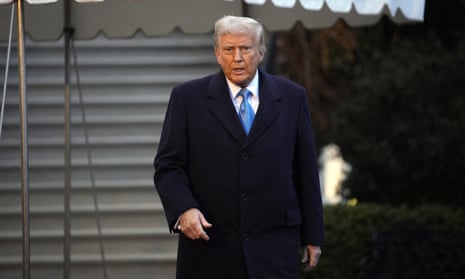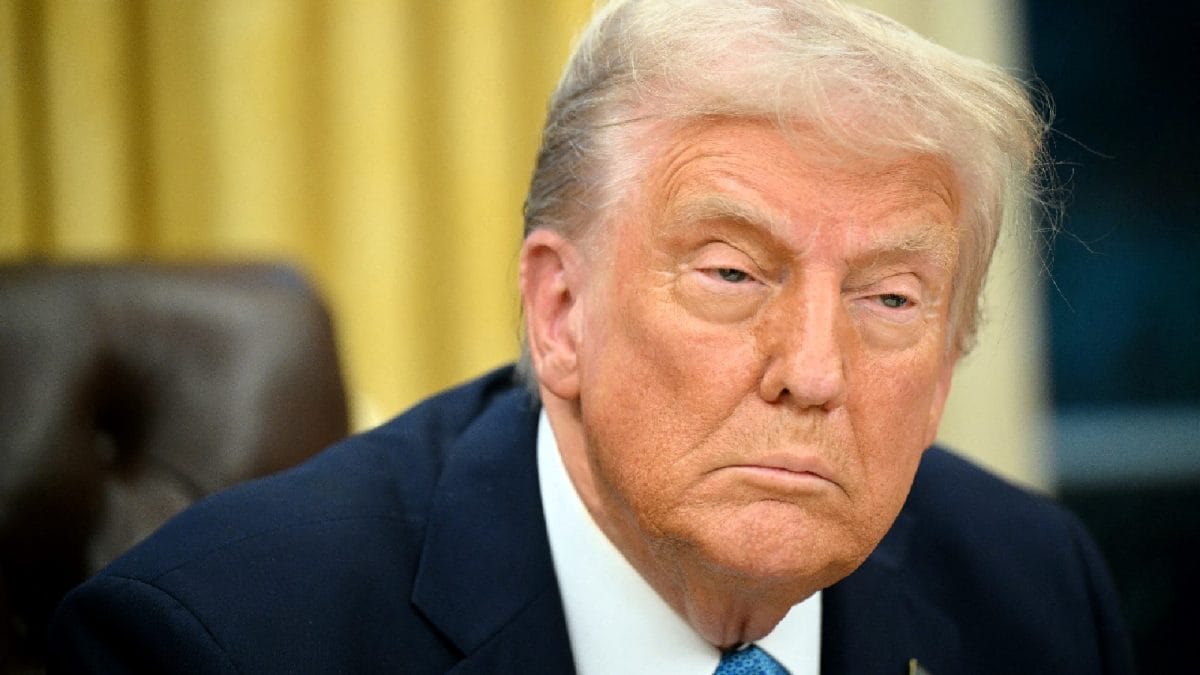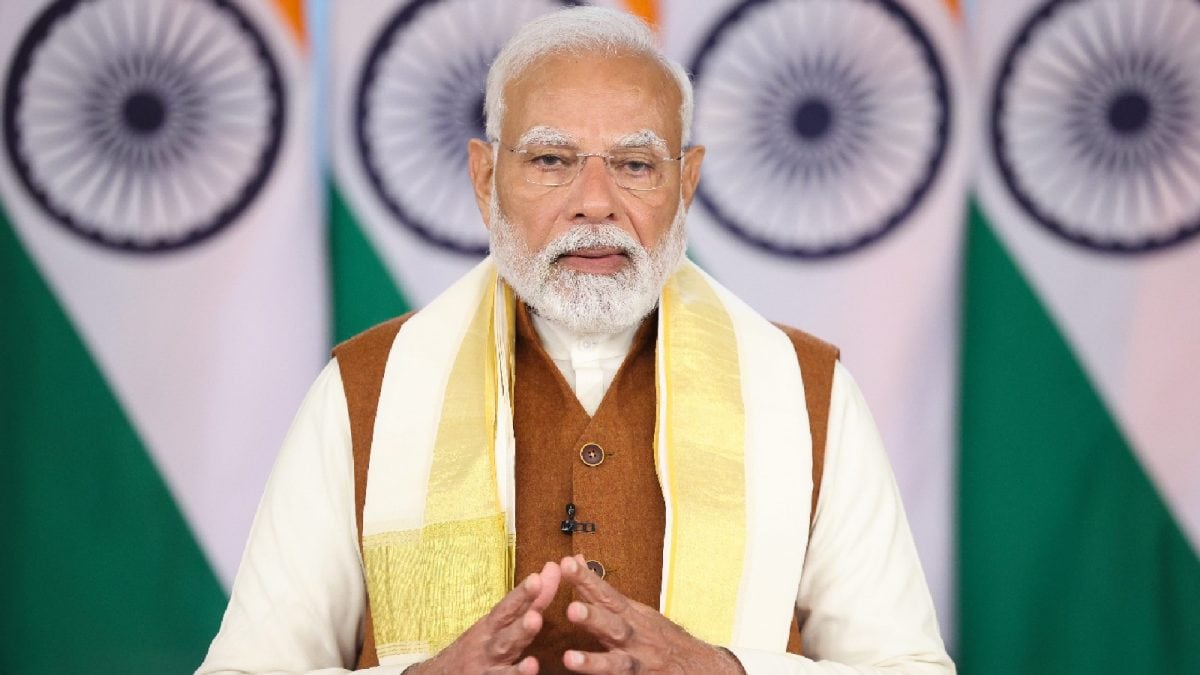Trump warns Americans that tariffs may cause 'pain'
Donald Trump has said that Americans may feel economic “pain” from his tariffs on key trading partners.
“Will there be some pain? Yes, maybe (and maybe not!)” Trump wrote on Sunday in all capital letters on his Truth social media platform, a day after signing off on tariffs on Mexico, Canada and China.
“But we will Make America Great Again, and it will all be worth the price that must be paid,” he added.
Key events Show key events only Please turn on JavaScript to use this feature
Top Democrats warn Trump tariffs will ‘hit Americans in their wallets’

Ed Pilkington
Ed Pilkington is chief reporter for Guardian US
Top Democrats have slammed Donald Trump’s plans to impose serious tariffs on America’s neighbors and allies, warning that they will hit working families and small businesses hard.
Chuck Schumer, the minority leader in the US senate, led the charge by saying the president’s threatened tariffs would likely “hit Americans in their wallets”. “It would be nice if Donald Trump could start focusing on getting the prices down instead of making them go up.”
Schumer added that the White House should set its sights on “competitors who rig the game, like China, rather than attacking our allies”.

Trump has set in train 25% import taxes for Canada and Mexico across all products other than Canadian energy which will face a 10% tariff. China will also have 10% tariffs, with the new impositions scheduled to start on Tuesday.
While the trio of affected countries are preparing retaliatory moves, with China saying it will lodge a lawsuit with the World Trade Organization against the US, Democratic leaders are flagging potentially devastating consequences domestically for American workers.
Ken Martin, who was chosen to be the next chair of the Democratic Committee on Saturday, said that blanket tariffs would cost working families while Trump would ensure that corporations get a pass.
“He’s using American workers as pawns in his petty political games. If a president promised that they’d help my family get by, and then they did this, I’d be pretty pissed off. So, you should be pissed off,” Martin said in a statement.
You can read the full story here:
Canada to 'stand firm' in trade battle with Trump - ambassador
As we have been reporting, Canadian and Mexican exports to the US will face a 25% tariff starting on Tuesday, and there will be a 10% levy on energy resources from Canada.
Canada, however, hopes the tariffs will not take effect on Tuesday but the Canadian public expects their government to stand firm in a trade dispute with Washington, the Canadian ambassador has said.
“I think the Canadian people are going to expect that our government stands firm and stands up for itself,” Ambassador Kirsten Hillman told ABC News.
“We’re not at all interested in escalating, but I think that there will be a very strong demand on our government to make sure that we stand up for the deal that we have struck with the United States.”

The US Census Bureau listed the 2024 trade deficit in goods with Canada – which sells about 75% of its exports to the US - as $55bn.
Justin Trudeau on Friday said Canadians could be “facing difficult times in the coming days and weeks” after Trump insisted he would impose the hefty new tariffs on goods coming across the border. In response, the Canadian prime minister unveiled matching 25% tariffs on 155bn Canadian dollars worth of US goods. He said 30bn will come into effect on Tuesday and another 125bn in three weeks.
On Friday, the right-leaning editorial board of the Wall Street Journal newspaper criticised Trump’s proposed tariffs in a piece titled “The Dumbest Trade War in History”.
Here is an extract from it:
President Trump will fire his first tariff salvo on Saturday against those notorious American adversaries . . . Mexico and Canada. They’ll get hit with a 25% border tax, while China, a real adversary, will endure 10%. This reminds us of the old Bernard Lewis joke that it’s risky to be America’s enemy but it can be fatal to be its friend.
Leaving China aside, Mr. Trump’s justification for this economic assault on the neighbors makes no sense. White House press secretary Karoline Leavitt says they’ve “enabled illegal drugs to pour into America.” But drugs have flowed into the U.S. for decades, and will continue to do so as long as Americans keep using them. Neither country can stop it.
Drugs may be an excuse since Mr. Trump has made clear he likes tariffs for their own sake. “We don’t need the products that they have,” Mr. Trump said on Thursday. “We have all the oil you need. We have all the trees you need, meaning the lumber.”
Trump issued a response to the editorial on Sunday, saying: “The ’Tariff Lobby,’ headed by the Globalist, and always wrong, Wall Street Journal, is working hard to justify... the decades long RIPOFF OF AMERICA, both with regard to TRADE, CRIME, AND POISONOUS DRUGS.”
Canada should become 'cherished 51st state', says Trump
Donald Trump has reiterated his desire for Canada to become America’s 51st state, something Justin Trudeau has strongly dismissed in the past.
Trump posted this to the truth social platform under an hour ago:
We pay hundreds of Billions of Dollars to SUBSIDIZE Canada. Why? There is no reason. We don’t need anything they have. We have unlimited Energy, should make our own Cars, and have more Lumber than we can ever use. Without this massive subsidy, Canada ceases to exist as a viable Country. Harsh but true! Therefore, Canada should become our Cherished 51st State. Much lower taxes, and far better military protection for the people of Canada — AND NO TARIFFS!
Arizona Congressman Greg Stanton has criticised Trump’s plans to impose tariffs on the US’s top trading partners - Mexico, Canada and China – saying it will increase the cost of goods for American consumers. He attached a list of everyday food items – such as eggs, potatoes and cheese – and said prices for such groceries will increase by 25% as a result of the new tariffs.
Trump warns Americans that tariffs may cause 'pain'
Donald Trump has said that Americans may feel economic “pain” from his tariffs on key trading partners.
“Will there be some pain? Yes, maybe (and maybe not!)” Trump wrote on Sunday in all capital letters on his Truth social media platform, a day after signing off on tariffs on Mexico, Canada and China.
“But we will Make America Great Again, and it will all be worth the price that must be paid,” he added.
Action against EU 'just a matter of time'
Donald Trump’s moves against Mexico, Canada and China are being closely watched elsewhere, especially in the EU, which has already been threatened with similar action by the US president.
Last month, on just his second day in office when he announced an investigation into US-China trade, Trump said: “Other countries are big abusers also, you know it’s not just China,” and added that he was also looking at trade with the EU. “We have a $350bn deficit with the European Union. They treat us very, very badly, so they’re going to be in for tariffs,” he said.
On Sunday, asked about Trump’s weekend moves, European Central Bank policymaker Klaas Knot said he expects new tariffs will lead to higher inflation and interest rates in the U.S. that will likely weaken the euro.
“It’s only a matter of time before the EU is targeted,” said Marchel Alexandrovich, an economist at Saltmarsh Economics in London. “In the meantime, the fact that Canada is responding and putting up tariffs against US goods is a sign of things to come and demonstrates the risks to global trade.”
Market falls expected

Graeme Wearden
Investors are bracing for falls when the markets open.
Trading on the brokerage IG’s weekend markets indicate shares are likely to slump on Monday, after Donald Trump’s order on Saturday to bring in sweeping tariffs this week, a move that could prompt a trade war with some of the country’s largest trading partners.
Technology stocks are expected to be hit, with the US’s Nasdaq index on track to fall 1.2% at the start of trading on Monday, according to IG. The official futures market opens on Sunday evening.
The Dow Jones index of 30 large US companies looked likely to fall by more than 0.7%, while the UK’s FTSE 100 – which ended last week at a record high – was on track for a 0.6% drop.
“The surprise for markets today isn’t so much Trump’s tariff announcements – largely as flagged,” said IG analyst Tony Sycamore. “It’s that Canada and Mexico retaliated immediately and that others, ie China and the EU, may follow their lead, resulting in a sharp contraction in global trade.”
After Donald Trump’s return to the White House, Volkswagen, Germany’s largest carmaker, said that tariffs would have a “harmful economic impact” on American consumers, as well as the international automotive industry.
German automakers say the tariffs will cause inflation for consumers.
“We are assessing any potential effects on the automotive industry and our company as a result of the announced tariffs,” Volkswagen said in a statement.
“We are counting on constructive talks between the trading partners to ensure planning security and economic stability and to avoid a trade conflict.”
Israeli prime minister Benjamin Netanyahu has said he will discuss “victory over Hamas,” countering Iran and expanding diplomatic relations with Arab countries in his meeting with Donald Trump this week.
Tuesday’s meeting at the White House will be Trump’s first with a foreign leader since returning to office in late January. It comes as US and Arab mediators begin the work of brokering the next phase of the fragile Gaza ceasefire agreement between Israel and Hamas.
Justin Trudeau announces tariffs on US products in retaliation against Trump – video
Leaders of China, Mexico and Canada targeted in Donald Trump’s tariff plans have swiftly reacted to them, with Canadian prime minister Justin Trudeau warning Americans that they would ultimately be the losers of a trade war.
On Saturday night, the outgoing Canadian leader made a televised address announcing concrete retaliatory measures including a tit-for-tat 25% tariff phased in across C$155bn ($107bn) worth of American products. You can watch Trudeau deliver his remarks in this video:
US tariffs risk having a 'really damaging impact' on world economy, UK home secretary warns
Over in the UK, the home secretary Yvette Cooper said that Trump’s tariff plans could have a “really damaging impact” on the global economy and growth.
The Labour cabinet minister said the UK wanted to break down trade barriers, not put them up.
Asked about Trump’s announcement, Cooper told the BBC: “Tariff increases really right across the world can have a really damaging impact on global growth and trade, so I don’t think it’s what anybody wants to see.”
She added that the UK’s focus was “on building trade links and better trading relationships, and removing barriers to trade, with the US, and also with other European countries and with countries right across the world”.
“We want to reduce the barriers to trade, make it easier for businesses,” Cooper said.
British ministers are hoping Trump will introduce more limited tariffs focusing on particular sectors and countries, which could spare the UK from the worst of any punitive measures. It is expected that Trump will eventually impose tariffs on European countries and target those with trade deficits.
Shadow business secretary Andrew Griffith told the BBC that the UK can avoid “some of the damage of tariffs” as he said the US is “a very strong ally” and biggest individual trading partner.
China says it will file a lawsuit with the World Trade Organization against the US
China, the world’s second biggest economy behind the US, will challenge American tariffs through the World Trade Organization (WTO), the country’s commerce ministry said in a statement.
It came after US President Donald Trump on Saturday ordered 25% tariffs on Canadian and Mexican imports and 10% on goods from China starting on Tuesday.
The imposition of tariffs by the US “seriously violates” WTO rules, the ministry said, urging the US to “engage in frank dialogue and strengthen cooperation”.
Filing a lawsuit with the WTO would be a largely symbolic move that Beijing has also taken against tariffs on Chinese-made electric vehicles by the EU.
The commerce ministry also said the tariffs were “not only unhelpful in solving the US’s own problems, but also undermine normal economic and trade cooperation”. As we mentioned in the opening summary, China has said it would take countermeasures to “safeguard its own rights and interests”. It is not clear exactly what form these will take yet. But for weeks Chinese foreign ministry spokesperson Mao Ning has said Beijing believes there is no winner in a trade war.
Ontario Premier Doug Ford called the tariffs “unjustified”, “unfair” and “illegal”, as he said they broke the US-Mexico-Canada Agreement reached in 2018 during Trump’s first term in office.
Ford told CNN:
Well, we’ll have retaliatory measures. It’s unfortunate, we don’t want to do it. We’d rather have a strong trading partner with the US…
We want to ship down more products, more critical minerals, more oil. That’s what we want to do. But I can assure you what president Trump underestimates: the resilience of the Canadian people.
He pointed out that Canada is the US’s largest trading partner and largest export destination. Ford said inflation is going to rise as a result of Trump’s actions.
He said Canada will announce “retaliatory” tariffs. Since the CNN interview, Canadian prime minister Justin Trudeau has said he will impose 25% tariffs on $155bn worth of American goods - $30bn will come into force on Tuesday and another $125bn in three weeks. He said Trump is unfairly “lumping” Canada in with China and Mexico, pointing out the fact that, compared to Mexico, a tiny amount of drugs are entering the US from Canada.
Trump said the tariffs were in part imposed over his concerns about illegal immigration and drug trafficking, and has said that Canada is among the countries profiting unfairly from trade with the US.
Ford told CNN:
What’s really disturbing when president Trump is using fentanyl as a reason, lumping us in with Mexico and China – the figures from US Customs is very clear.
There’s over 9,600 kilos coming fentanyl coming from Mexico. Ours is 19 kilos, which is too much, which is point 001% of fentanyl, compared to Mexico coming into the US, compared to over 25,000 kilos of narcotics, be it heroin or cocaine, opioids coming from the US into Canada.
President Trump’s decision to tariff Canada is extremely disappointing and will hurt millions of workers on both sides of the border. We don’t want to be here, but make no mistake: Canada will hit back and we’ll hit back hard. pic.twitter.com/BcqMR4yfq3
— Doug Ford (@fordnation) February 2, 2025US consumers will see higher prices at the gas pump from Donald Trump’s decision on Saturday to apply tariffs on Canadian and Mexican oil, according to analysts and fuel traders.
The likely hike in fuel prices reflects the double-edged nature of Trump’s trade protections, which are designed to bolster domestic business and pressure US neighbors to curb illegal immigration and drug smuggling, but which will also run counter to his promises to tackle inflation.
The US imports some 4m barrels per day of Canadian oil, 70% of which is processed by refiners in the midwest. It also imports more than 450,000 barrels per day of Mexican oil, mainly for refiners concentrated along the US Gulf coast.
Tariffs on those imports mean higher costs for making finished fuels like gasoline, much of which is likely to be passed along to US consumers.
You can read the full story here:
Japan 'deeply concerned' about how Trump's tariffs could impact the world economy
Japanese finance minister, Katsunobu Kato has expressed “deep concern” over the tariff proposal, which may spark a wider trade war as they threaten upheaval across supply chains, from energy to cars to food.
He told Fuji TV: “We’re deeply concerned about how these tariffs could affect the world’s economy.”
“Japan needs to scrutinise these policies and their effects, and take appropriate measures,” the minister was quoted by Fuji TV as saying.
Japanese prime minister Shigeru Ishiba is expected to meet Trump later this week in the US, according to reports, as Tokyo tries to strengthen ties with the new Trump administration. Japanese companies are worried that protectionist policies could dampen and disrupt global shipments.
South Korea’s acting President Choi Sang-mok, meanwhile, has ordered government agencies to closely monitor any impact on domestic firms and the economy after Trump ordered sweeping tariffs on goods from Mexico, Canada and China, his office said.
The tariffs are expected to affect South Korean companies running factories in these countries.
China, Mexico and Canada accounted for more than 40% of imports into America last year. US President Donald Trump, who has also threatened to impose tariffs against EU nations, says the new tariffs will help grow the US economy, raise tax revenues and protect American jobs. However, critics, including many economists, have warned that additional costs will be passed onto American consumers, exacerbating an already acute cost of living crisis.
My colleague Lauren Aratani has done this useful explainer exploring how US consumers will be affected by the tariffs, why Trump is using them to enact his policy agenda and how other countries have responded to the US president’s announcement.
Canada and Mexico hit back against Trump's trade tariffs as Beijing vows 'countermeasures'
Canada, Mexico and China have promised to hit back after the imposition of sweeping US tariffs announced by Donald Trump on Saturday.
Trump claimed the move was in response to a “major threat” from illegal immigration and drugs. Canadian and Mexican exports to the US will face a 25% tariff starting Tuesday, although energy resources from Canada will have a lower 10% levy.
Goods from China, which already face various rates of duties, will see an additional 10% tariff. A tariff is a domestic tax placed on goods as they enter a country, proportional to the value of the import.
Trump invoked the Emergency Economic Powers Act in imposing the tariffs, with the White House saying “the extraordinary threat posed by illegal aliens and drugs, including deadly fentanyl, constitutes a national emergency.”
The aim is to hold all three countries “accountable to their promises of halting illegal immigration and stopping poisonous fentanyl and other drugs from flowing into our country,” the White House added.

How has China, Canada and Mexico reacted to the sweeping tariff announcement?
Agence France-Presse (AFP) reported a statement from China’s commerce ministry that it would take “corresponding countermeasures” and file a claim against Washington at the World Trade Organization.
Mexican President Claudia Sheinbaum announced that her country would impose retaliatory tariffs.
Sheinbaum said she had told her economy minister “to implement Plan B that we have been working on, which includes tariff and non-tariff measures in defense of Mexico’s interests.”
Canadian Prime Minister Justin Trudeau - who spoke with Sheinbaum - separately said his country would hit back with 25% levies of its own on select American goods worth Can$155 billion (US$106.6 billion), with a first round on Tuesday followed by a second one in three weeks.
“We’re certainly not looking to escalate. But we will stand up for Canada, for Canadians, for Canadian jobs,” he said, as he warned of a fracture in longstanding Canada-US ties.

 3 hours ago
3 hours ago


















